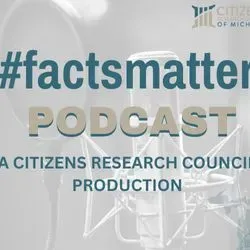
24 September 2025
Without renewal of healthcare tax credits, premiums expected to jump 70%
#FactsMatter, the Citizens Research Council of Michigan podcast
About
Karley Abramson, health policy associate for the Research Council, speaks with Guy about her most recent paper, Upcoming Changes to the Affordable Care Act (ACA) Tax Credits Will Also Disrupt Michigan’s Health Care System, which details how the One Big Beautiful Bill Act would likely result in about 200,000 fewer Michiganders having health care, including about 100,000 who will become uninsured because Congress did not renew or extend the Enhanced Premium Tax Credit (EPTC). The other half are expected to become uninsured due to new administrative requirements that may create barriers to people qualifying for EPTC.
Data indicates that about 8 million fewer Americans will have health care over the next decade.
“Our research found that of the 530,000 Michiganders who purchase health care through the ACA, more than 350,000 are covered by a tax credit-supported plan,” said Abramson. “As a result of the tax credit enhancement under the 2021 American Rescue Plan 2021, expanding both the size of the credit and who is eligible, premiums for plans sold on the Marketplace have been much cheaper for many enrollees compared to 2020 and earlier.”
Since the introduction of the Enhanced Premium Tax Credit, nationwide coverage through the Affordable Care Act marketplace has doubled.
Abramson also addressed how the end of these tax credits goes far beyond the financial hardship they impose on Michiganders who directly use them.
“This would lead to worse health outcomes for people across Michigan. More uninsured people mean health care costs will go up for everyone, in the form of higher health insurance premiums paid by individuals and employers,” she said.
More uninsured people mean health care costs will go up for everyone in the form of higher health insurance premiums, the paper notes. Michigan hospitals will likely see increased rates of uncompensated care, which will worsen hospitals’ financial burdens and potentially lead to reduced services and even closure. Much in the same way that the OBBBA Medicaid cuts are expected to impact Michigan, people not buying private insurance through the Marketplace will likely have cascading effects across the state.
“Combined with cuts to Medicaid — which already threaten to strip health care from hundreds of thousands of Michiganders — health care in our state faces a dire downward spiral that will put people’s health, safety and well-being at risk.
The paper also addresses solutions, with the most immediate being for policymakers to renew the EPTC before the end of this year.
“We also believe that state legislators in Lansing can create a Michigan-specific tax credit to assist those purchasing insurance through the marketplace or provide incentives for preventative care and vaccinations,” said Abramson.
“Doing nothing will have serious long-term ramifications for Michigan families, Michigan businesses and Michigan’s economy.”
Data indicates that about 8 million fewer Americans will have health care over the next decade.
“Our research found that of the 530,000 Michiganders who purchase health care through the ACA, more than 350,000 are covered by a tax credit-supported plan,” said Abramson. “As a result of the tax credit enhancement under the 2021 American Rescue Plan 2021, expanding both the size of the credit and who is eligible, premiums for plans sold on the Marketplace have been much cheaper for many enrollees compared to 2020 and earlier.”
Since the introduction of the Enhanced Premium Tax Credit, nationwide coverage through the Affordable Care Act marketplace has doubled.
Abramson also addressed how the end of these tax credits goes far beyond the financial hardship they impose on Michiganders who directly use them.
“This would lead to worse health outcomes for people across Michigan. More uninsured people mean health care costs will go up for everyone, in the form of higher health insurance premiums paid by individuals and employers,” she said.
More uninsured people mean health care costs will go up for everyone in the form of higher health insurance premiums, the paper notes. Michigan hospitals will likely see increased rates of uncompensated care, which will worsen hospitals’ financial burdens and potentially lead to reduced services and even closure. Much in the same way that the OBBBA Medicaid cuts are expected to impact Michigan, people not buying private insurance through the Marketplace will likely have cascading effects across the state.
“Combined with cuts to Medicaid — which already threaten to strip health care from hundreds of thousands of Michiganders — health care in our state faces a dire downward spiral that will put people’s health, safety and well-being at risk.
The paper also addresses solutions, with the most immediate being for policymakers to renew the EPTC before the end of this year.
“We also believe that state legislators in Lansing can create a Michigan-specific tax credit to assist those purchasing insurance through the marketplace or provide incentives for preventative care and vaccinations,” said Abramson.
“Doing nothing will have serious long-term ramifications for Michigan families, Michigan businesses and Michigan’s economy.”